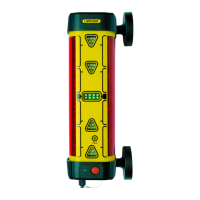11
Range 650 ft.(200 meters)
varies with laser used
Accuracy
Fine 1/4” (6 mm) typical
Coarse 1/2” (12 mm) typical
Actual accuracy depends on beam diameter and distance to the transmitter.
Reception height 9.75” (25 cm) detection window
Reception angle 360 degrees
Vertical indicator +/- 5°
Environmental (receiver) Waterproof; IP67
Receiver power NiMh rechargeable battery;
charging time: 12 hours
Receiver battery life Approx. 25-30 hours
(depends on use and temperature)
Remote display power 12-24V
cigarette outlet power cord
Frequency range 65’ (20 m)
between receiver and remote display
Type of attachment
LMR 360R Clamps OR magnets
LMD 360R Suction cup mount
Size
LMR 360R 14 3/4” x 3” x 4”
(375 x 75 x 107mm)(w/o clamps)
LMD 360R 4 1/8” x 3/4” x 7 3/4"
(105 x 20 x 197 mm)
Weight
LMR 360R with magnets 2700 gr.
LMR 360R with clamps 3350 gr.
LMD 360R 250 gr. - 1/2 lb.
10. Specifications
10
This system complies with the European R&TTE standard and
American FCC standard.
WARNING: This equipment complies with Part 15 of the FCC rules.
Any changes or modifications not expressly approved by the manu-
facturer could void the user’s authority to operate the equipment.
Operation is subject to the following two conditions: (1) this device
may not cause harmful interference, and (2) this device must accept
any interference received, including interference that may cause
undesired operation.
This equipment has been tested and found to comply with the limits
for a Class B digital device, pursuant to Part 15 of FCC rules.
These limits are designed to provide reasonable protection against
harmful interference in a residential installation. This equipment gen-
erates, uses, and can radiate radio frequency energy and, if not
installed and used in accordance with the instructions, may cause
harmful interference to radio communications. However, there’s no
guarantee that interference will not occur in a particular installation.
If this equipment does cause harmful interference to radio or televi-
sion reception, which can be determined by turning the equipment
off and on, the user is encouraged to try to correct the interference
by one or more of the following measures:
• Reorient or relocate the receiving antenna
• Increase the separation between the equipment and receiver
• Connect the equipment into an outlet on a circuit different from
that to which the receiver is connected
• Consult the dealer or an experienced radio/TV technician for help
Notice for Canada
This Class B digital device meets all require-ments of Canadian
Radio Standards Specification RSS-210.
Cet appareil numérique de la Class B respecte toutes les exigences
du Règlement sur le matériel brouilleur du Canada.
9. Radio Frequency Interf e r e n c e

